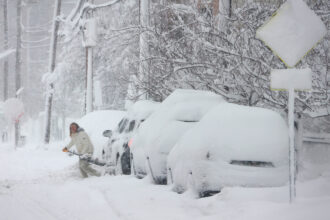Study: Michigan Climate Plan Would Add 129,000 Jobs (AP)
Michigan could get a significant economic boost — 129,000 jobs and a $25 billion rise in gross state product — by reducing greenhouse gas emissions, according to an analysis by the Center for Climate Strategies.
New BLM Rules to Limit Wind Power in Wyoming (Reuters)
Wind energy development is "functionally precluded" in about 20 percent of Wyoming under new Bureau of Land Management guidelines laid out to protect a threatened bird, the governor’s office said.
New French Carbon Tax Draft Will Exempt Electricity (Dow Jones)
French Finance Minister Christine Lagarde said today that a new carbon tax draft bill the government is expected to outline later this month will maintain exemptions for electricity.
DOE Hits LG Electronics in Energy Star Crackdown (Business Green)
In what may be the start of an effort to tighten oversight of energy-efficiency claims, the U.S. Department of Energy announced it would strip LG Electronics of the right to use the Energy Star certification label on 20 models of its refrigerators.
CIA Sharing Data With Climate Scientists (New York Times)
The United States’ top scientists and intelligence officers are collaborating on an effort to use the federal government’s intelligence assets — including spy satellites and other classified sensors — to assess the hidden complexities of environmental change.
$40 Carbon Price Needed for Commercial CCS, Study Says (Earth2Tech)
Research firm ABI says that the price of carbon on emissions trading markets needs to hit $40 per ton of CO2 for CCS to “attain true commercial status.” That’s a problem.
Australia Bakes in Hottest Decade; Brushfires Return (Reuters)
Australia experienced its hottest decade on record from 2000 to 2009 due to global warming, the nation’s bureau of meteorology said on today, as summer bushfires again burn drought lands and destroy homes.
Saudi Arabia Satisfied with Copenhagen Outcome (BBC)
Oil giant Saudi Arabia says it is "satisfied" with the conclusion of last month’s UN climate summit in Copenhagen, which failed to set any legally binding targets for greenhouse gas reductions that might cut into OPEC’s revenues.
Spain’s Solar Export Ambition (Greentech)
Spain country has carved a reputation as a large solar market, but it’s intent on building a strong technology export industry as well.
New Nanohybrid Catalysts Could Streamline Biofuel Production (Green Car Congress)
Researchers have developed a new family of solid catalysts that can stabilize water-oil emulsions and catalyze reactions at the liquid/liquid interface. Such a recoverable catalyst would be “highly advantageous” in streamlining processes such as biomass refining.
Mexico City Battles Water Crisis with Taxes, Pleas (Reuters)
Lake Avandaro has long been the emblem of leisure in this wealthy, colonial town west of Mexico City, but the capital sucked it half-dry last spring.
Madagascar’s Political Chaos
Threatens Conservation Gains (Yale Environment 360)
Since the government’s collapse, Madagascar’s rainforests have been plundered for their precious wood and unique wildlife. But now there are a few encouraging signs, as officials promise a crackdown on illegal logging and ecotourists begin to return to the island.
‘Avatar’ Arouses Conservatives’ Ire (Los Angeles Times)
It’s no secret that "Avatar" has been stunningly successful on nearly every front. But amid the avalanche of praise and popularity, guess who hates the movie? America’s prickly cadre of political conservatives.
About This Story
Perhaps you noticed: This story, like all the news we publish, is free to read. That’s because Inside Climate News is a 501c3 nonprofit organization. We do not charge a subscription fee, lock our news behind a paywall, or clutter our website with ads. We make our news on climate and the environment freely available to you and anyone who wants it.
That’s not all. We also share our news for free with scores of other media organizations around the country. Many of them can’t afford to do environmental journalism of their own. We’ve built bureaus from coast to coast to report local stories, collaborate with local newsrooms and co-publish articles so that this vital work is shared as widely as possible.
Two of us launched ICN in 2007. Six years later we earned a Pulitzer Prize for National Reporting, and now we run the oldest and largest dedicated climate newsroom in the nation. We tell the story in all its complexity. We hold polluters accountable. We expose environmental injustice. We debunk misinformation. We scrutinize solutions and inspire action.
Donations from readers like you fund every aspect of what we do. If you don’t already, will you support our ongoing work, our reporting on the biggest crisis facing our planet, and help us reach even more readers in more places?
Please take a moment to make a tax-deductible donation. Every one of them makes a difference.
Thank you,











